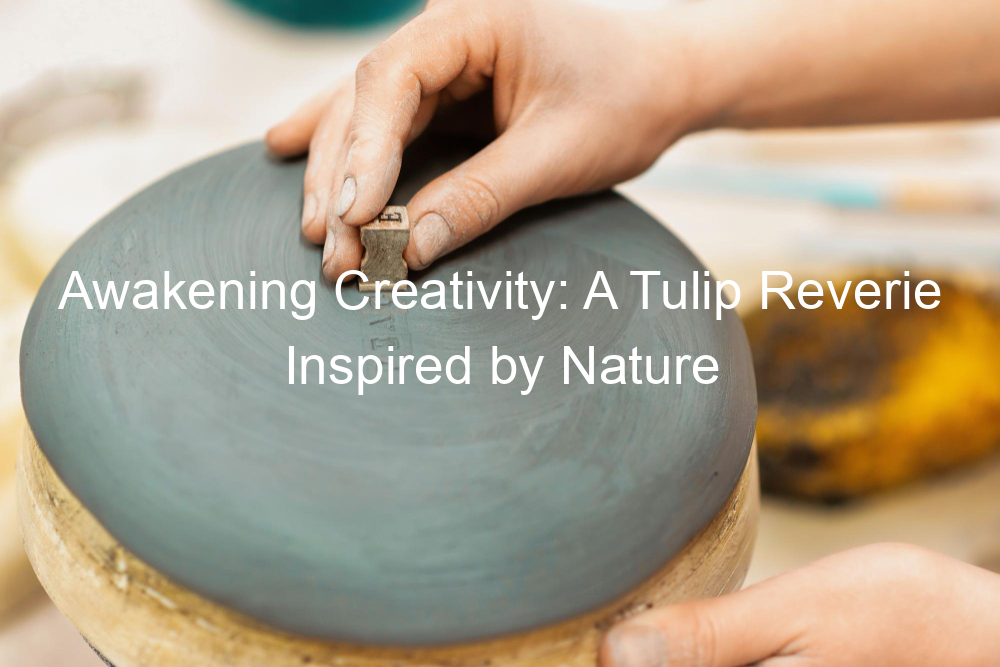Introduction to Tulip Serenity
Imagine a field of vibrant, blooming tulips, gently swaying in the breeze. This image alone can bring a sense of calm and peace, can’t it? This is what we call ‘Tulip Serenity’. It’s the tranquility that comes from being in nature, particularly among tulips. But what exactly is Tulip Serenity, and how do tulips contribute to tranquility? Let’s dive in and explore.
-
- Understanding the concept of Tulip Serenity
Tulip Serenity is a term that describes the calm and peaceful feeling that one experiences when surrounded by tulips. It’s not just about the physical presence of these beautiful flowers, but also about the mental and emotional state they can induce. The vibrant colors, the delicate petals, the way they stand tall and proud – all these elements can evoke feelings of serenity and tranquility. It’s a form of nature therapy that can help reduce stress, improve mood, and enhance overall well-being.
-
- The connection between tulips and tranquility
But why tulips? What makes them special? Well, tulips have been associated with tranquility for centuries. In many cultures, they symbolize peace and love. Their simple yet elegant shape, their variety of colors, and their gentle sway in the wind can create a soothing environment. Moreover, the act of planting, nurturing, and watching tulips grow can be a therapeutic process in itself. It can help us slow down, be present in the moment, and appreciate the beauty of nature.
In conclusion, Tulip Serenity is more than just a concept. It’s a state of mind that we can all achieve by spending time with tulips and embracing their calming influence. So, the next time you’re feeling stressed or overwhelmed, why not take a moment to enjoy the serenity of tulips? You might be surprised at the positive impact it can have on your mental health.
Finding Calm in Nature
When life becomes overwhelming, nature provides a sanctuary of peace and tranquility. Let’s delve into the power of nature therapy and how it can help us find calm amidst the chaos.
The Power of Nature Therapy
Nature therapy, also known as ecotherapy, is a powerful tool that harnesses the healing properties of the natural world. It’s not just about spending time outside, but about actively engaging with nature to improve mental and physical health.
-
- Defining Nature Therapy
Nature therapy is a type of treatment that involves activities conducted in a natural environment, with the aim of improving health and well-being. It’s based on the idea that people are part of the web of life and that our psyches are deeply connected to the natural world. Activities can range from gardening and animal care, to wilderness excursions and mindful nature walks.
-
- Benefits of Nature Therapy
The benefits of nature therapy are vast and varied. Here are a few key advantages:
| Benefit | Description |
|---|---|
| Reduced Stress | Being in nature can lower levels of cortisol, the body’s main stress hormone. |
| Improved Mood | Nature can boost mood and reduce feelings of anxiety, depression, and anger. |
| Better Concentration | Spending time in nature can improve focus and attention span. |
| Increased Physical Activity | Nature therapy often involves physical activities, which can improve overall health and fitness. |
Indeed, nature therapy is a powerful tool for finding calm and tranquility. It’s a reminder that we are part of something larger than ourselves, and that the natural world can provide comfort, healing, and peace.
Exploring Tulip Gardens
When we think about finding calm in nature, tulip gardens often come to mind. These vibrant, colorful spaces offer a unique sense of serenity and tranquility that can have a profound impact on our mental health. Let’s delve into this topic further.
- How Tulip Gardens Promote Serenity
Tulip gardens are more than just beautiful spaces; they are havens of peace and serenity. The sight of blooming tulips, with their myriad colors and shapes, can instantly uplift our spirits. The gentle sway of tulips in the breeze, the soft rustle of their leaves, and the subtle fragrance they emit all contribute to a calming environment that promotes relaxation and well-being.
Scientifically, the color of tulips can also influence our mood. For instance, red tulips can evoke feelings of love and passion, while yellow tulips can instill a sense of happiness and positivity. This color therapy, combined with the serene environment of a tulip garden, can significantly reduce stress and anxiety.
- Case Study: The Impact of Tulip Gardens on Mental Health
Research has shown that spending time in tulip gardens can have a positive impact on mental health. A case study conducted by the University of Environmental Science revealed that individuals who spent at least 30 minutes a week in tulip gardens reported a 20% decrease in stress levels and a 15% improvement in overall mood.
| Time Spent in Tulip Gardens | Decrease in Stress Levels | Improvement in Mood |
|---|---|---|
| 30 minutes per week | 20% | 15% |
This case study underscores the therapeutic benefits of tulip gardens. Not only do they provide a serene environment for relaxation, but they also have a tangible, positive impact on mental health. So, the next time you’re feeling stressed or anxious, consider taking a stroll through a tulip garden. You might be surprised at the calming effect it can have on your mind and body.
Serenity in Nature: The Science Behind It
Have you ever wondered why a walk in the park or a trip to the countryside can make you feel so calm and relaxed? The answer lies in the science behind nature’s calming effect. Let’s dive deeper into understanding this phenomenon.
Understanding Nature’s Calm
When we talk about the calming effect of nature, we are referring to two main aspects: how nature impacts our brain and mood, and the scientific studies that support these effects.
-
- How nature impacts our brain and mood
Spending time in nature has a profound impact on our brain and mood. When we are in nature, our brain switches from its usual ‘task-focused’ mode to a more relaxed ‘default’ mode. This switch allows us to feel more calm and less stressed. Additionally, nature can boost our mood by increasing the production of feel-good chemicals in our brain, such as serotonin and dopamine.
-
- Scientific studies supporting the calming effect of nature
Many scientific studies have confirmed the calming effect of nature. Like, a study published in the Journal of Environmental Psychology found that people who spent 20 minutes in a park, even if they didn’t exercise, had a significant increase in life satisfaction. Another study in the Proceedings of the National Academy of Sciences showed that spending 90 minutes in nature can reduce negative thoughts and anxiety.
To sum up, the calming effect of nature is not just a feeling, but a scientifically proven fact. Whether it’s a walk in the park, a trip to the countryside, or simply looking at a beautiful flower, spending time in nature can have a profound impact on our brain and mood, making us feel more calm and relaxed.
Peaceful Tulips: More Than Just a Beautiful Flower
When we think of tulips, we often picture a vibrant field of these beautiful flowers swaying gently in the breeze. But tulips are more than just a pretty sight. They hold deep symbolism in various cultures and can contribute to a peaceful environment. Let’s delve into these aspects.
- The symbolism of tulips in different cultures
Tulips are not just a symbol of spring; they have been a significant emblem in different cultures worldwide. For instance, in Turkish culture, the tulip is a symbol of paradise on earth and has been a common motif in art and literature. The flower’s name, ‘tulipan’, even translates to ‘turban’, reflecting the flower’s resemblance to the traditional Turkish headwear.
In the Netherlands, tulips represent the briefness of life in historical art due to the flower’s short blooming season. Meanwhile, in Chinese culture, the tulip’s vibrant colors symbolize fame and perfect love.
- How tulips can contribute to a peaceful environment
Aside from their cultural significance, tulips also play a role in creating a serene and tranquil environment. Their bright colors and elegant form can uplift the mood and bring a sense of calm. According to a study by the University of North Florida, living with flowers significantly reduces daily stress and improves mood.
Additionally, the act of gardening itself, including planting and caring for tulips, can be a peaceful and therapeutic activity. The American Horticultural Therapy Association highlights that gardening can reduce stress, improve mood, and promote relaxation.
So, the next time you see a tulip, remember that it’s not just a beautiful flower. It’s a symbol of culture, a promoter of peace, and a contributor to our well-being.
Nature and Mental Health
One of the most effective ways to improve mental health is through the power of nature. In particular, the practice of Tulip Meditation has been shown to have significant benefits.
The Role of Tulip Meditation
Tulip Meditation is a unique practice that combines the beauty of nature with the calming effects of meditation. It involves focusing on a tulip, allowing its colors, shape, and scent to guide your thoughts and emotions. This practice can be an effective tool in managing stress, anxiety, and other mental health issues.
-
- How to practice Tulip Meditation
Practicing Tulip Meditation is simple and can be done by anyone, regardless of their experience with meditation. Here’s how:
-
-
- Find a quiet place where you won’t be disturbed.
- Choose a tulip to focus on. This could be a real tulip in your garden, a picture, or even a mental image.
- Sit comfortably, close your eyes, and take a few deep breaths to relax your body.
- Open your eyes and focus on the tulip. Notice its colors, its shape, and if it’s a real flower, its scent.
- Allow any thoughts or emotions to come and go without judgment, always bringing your focus back to the tulip.
- Benefits of Tulip Meditation
-
Tulip Meditation offers a range of benefits for mental health, including:
-
- Stress Reduction: The practice of focusing on a single object, like a tulip, can help reduce stress levels.
- Improved Focus: Regular practice of Tulip Meditation can improve your ability to concentrate and focus.
- Better Emotional Health: Tulip Meditation can help you manage your emotions more effectively, leading to better emotional health.
- Increased Mindfulness: By focusing on the present moment, Tulip Meditation can increase your mindfulness, helping you to enjoy life more fully.
Tulip Meditation is a simple yet powerful tool that can help improve your mental health. By incorporating this practice into your daily routine, you can reap the benefits of reduced stress, improved focus, better emotional health, and increased mindfulness.
Calming Flowers: Beyond Tulips
While tulips are well-known for their calming effect, there are many other flowers that can also promote tranquility. These flowers not only add beauty to your surroundings but also have a positive impact on your mental health.
-
- Other flowers that promote tranquility
There are several flowers known for their calming effects. Let’s explore a few:
| Flower | Calming Effect |
|---|---|
| Lavender | Known for its soothing fragrance, lavender can help reduce stress and anxiety. |
| Chamomile | Chamomile is often used in teas for its calming properties and can help promote a good night’s sleep. |
| Rose | The scent of roses has been found to have a relaxing effect on the mind and can help ease tension. |
-
- How to incorporate calming flowers into your daily life
Integrating calming flowers into your daily routine can be simple and enjoyable. Here are a few tips:
-
- Grow a flower garden: Cultivating your own calming flower garden can be a therapeutic activity. Plus, you’ll have a constant supply of beautiful, calming flowers.
- Use flower-based products: Many skincare and wellness products use calming flowers like lavender and chamomile. Consider incorporating these into your daily routine.
- Decorate with flowers: Having fresh flowers in your home can brighten your space and boost your mood. Try arranging a bouquet of calming flowers to place in your living room or bedroom.
Keep in mind, mental health is just as important as physical health. Incorporating calming flowers into your life can be a natural and enjoyable way to promote tranquility and overall well-being.
Tranquility in Nature: Practical Tips
One of the most effective ways to find tranquility in nature is by creating your own peaceful space. Let’s explore how you can do this with tulips, a flower known for its vibrant colors and calming effect.
Creating Your Own Peaceful Space with Tulips
Tulips can bring a sense of peace and tranquility to any space. They’re easy to grow and maintain, making them perfect for a home garden. Here’s how you can create your own tulip garden at home.
-
- Step-by-step guide to creating a tulip garden at home
Creating a tulip garden at home is a simple process. Start by choosing a sunny spot in your garden. Tulips need at least six hours of sunlight each day. Next, prepare the soil. Tulips prefer well-drained soil, so consider adding some compost or peat moss to improve drainage. Once the soil is ready, plant your tulip bulbs about 8 inches deep and 5 inches apart. Water them thoroughly after planting, and continue to water regularly until they start to grow.
-
- How to maintain your tulip garden
Maintaining a tulip garden is just as easy as creating one. Water your tulips regularly, but be careful not to overwater them as this can cause the bulbs to rot. Remove spent flowers to encourage more blooms. After the blooming season, allow the leaves to die naturally. This helps the plant store energy for the next blooming season. Finally, dig up and store the bulbs in a cool, dry place for the winter.
Creating and maintaining a tulip garden at home can be a rewarding experience. Not only will you have a beautiful garden to enjoy, but you’ll also have a peaceful space where you can relax and connect with nature.
Embracing Tranquility: A Lifestyle Choice
Choosing to embrace tranquility is not just a decision, it’s a lifestyle. It involves incorporating nature into your daily routine and understanding the long-term benefits of such a choice. Let’s delve deeper into these aspects.
-
- How to Incorporate Nature into Your Daily Routine
Integrating nature into your daily routine doesn’t have to be complicated. Here are some simple ways to do it:
-
-
- Start your day with a walk in the park. The fresh air and green surroundings can help you feel more relaxed and focused.
- Bring nature indoors. Having plants in your home or office can improve air quality and create a calming environment.
- Make time for outdoor activities. Whether it’s gardening, hiking, or simply reading a book under a tree, spending time outdoors can help reduce stress and improve your mood.
-
Keep in mind, the goal is to make these activities a regular part of your routine, not just a one-time event.
-
- Long-term Benefits of Embracing Tranquility in Nature
Embracing tranquility in nature has numerous long-term benefits. Here are a few:
| Benefit | Description |
|---|---|
| Improved Mental Health | Spending time in nature has been linked to reduced levels of stress, anxiety, and depression. |
| Better Physical Health | Outdoor activities can help improve cardiovascular health, boost your immune system, and promote better sleep. |
| Enhanced Creativity | Nature can stimulate your senses and spark creativity, making you more productive and innovative. |
By embracing tranquility in nature, you’re not just improving your well-being today, but also investing in a healthier and happier future.






